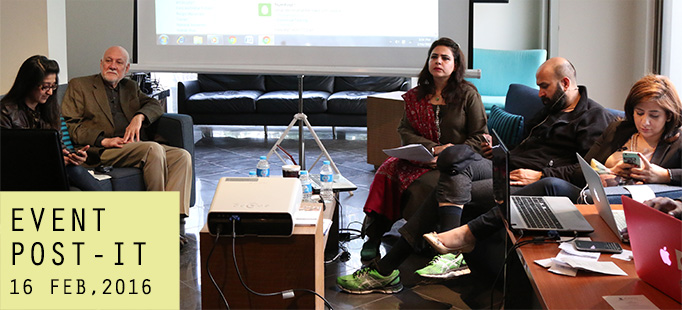Twitter Cafe
Jinnah Institute’s Twitter Café | #ContinueTalking
Date: February 16, 2016
On 16/02/16 Jinnah Institute held its second Twitter Café for social media users, activists, media persons and policy practitioners. The panelists steered the two hour-long online conversation, accessible to viewers on Twitter under the hashtag #ContinueTalking, fielding questions from a virtual audience on prospects and challenges for India-Pakistan cooperation in 2016, and the imperatives of continued engagement on issues including Kashmir, terrorism and climate-change. The panel comprised Jinnah Institute Honourary Vice President Amb. Aziz Ahmed Khan, NBC correspondent Wajahat S. Khan, USIP Country Representative Sehar Tariq and AAJ TV anchor Gulmeenay Sethi. The event was moderated by Ammara Durrani, garnering significant online attention. Over 300 Tweets were recorded, and virally #ContinueTalking became the second most trending hashtag in Pakistan.
In his opening remarks, Amb. Aziz Ahmad Khan spoke about the Chaophraya Dialogue’s mandate and achievements in terms of policy reform across the border. In response to a question, he noted that since 2003, the Pakistan Foreign Office had made a concerted effort towards engagement with India. From 2004 to 2007, great strides were being made in improving relations, with Pakistan at the forefront of these efforts. This unique window had provided both sides with the opportunity to rewrite their own history, but was unfortunately hijacked by events. He also noted that both India and Pakistan were energy-starved countries and it was important to engage on issues of energy cooperation and trade.
On the issue of climate change, Amb. Aziz remarked that this was a dangerous new faultline in South Asia, and that so far no scientific study had been carried out to ascertain the exact rate of glacial melt in the Himalayas. It was crucial for both Islamabad and New Delhi to cooperate in mitigating the effects of climate change, since these transcended state boundaries in the form of flash floods and drought. “This is a subject on which the two countries can cooperate even when relations are bad,” he observed, adding that while it was tragic that soldiers are being killed on the Siachen glacier, it was the “soldiers [that] are killing Siachen” with their military hardware.
Panelists also called for the inclusion of women in peacebuilding processes. They were all of the opinion that having women at the negotiating table increased the chances of success, and that women contributed positively to diplomacy. Wajahat S. Khan held that Jinnah Institute President Senator Sherry Rehman was a prime example of the difference that women could make, both inside and outside government, and lauded her diplomacy and advocacy efforts in and beyond South Asia. He also observed that while Pakistan was highly invested in better relations with its neighbour, the same could not be said of India, where attitudes towards Pakistan could best be described as indifferent. He also discussed the importance of new human security dynamics in South Asia including tensions over water. He added that the Pakistan military also carried stakes in better relations with India, as long as this entailed dividends for Pakistan, and that General Pervez Musharraf’s initiatives with India had enjoyed strong support within military quarters.
Ammara Durrani, meanwhile, noted that January’s siege on Pathankot Airbase had marked a bad start to the year for India-Pakistan relations. She spoke about the importance of the media in influencing public perceptions on either side of the border, and that journalists had a special responsibility to convey accurate information and analysis to their audiences.
In her intervention, Sehar Tariq highlighted that civil society groups, and not just NGOs and think-tanks, need to be more invested in peace processes, and that both sides needed to work harder to get a new generation of millennials invested in peace ties. “If you look at the history of India and Pakistan, it is evident which side has been more invested in peace talks,” she maintained, adding that whenever Pakistan made peace overtures to New Delhi, these enjoyed the full support of all political parties.
Gulmeenay Sethi, meanwhile, felt that Pakistan and India had “no choice but to talk”. She noted that the media has often played a negative role in Indo-Pak relations and implored fellow television journalists to refrain from adding to the confusion when it came to discussing developments in the Indo-Pak relationship.
A live Twitter-feed was used to map the online debate, which gave panelists an opportunity to take questions and engage with a much larger virtual audience. University participants from NYU, LUMS and Queen Mary also sent in video questions which were played during the Café. Panelists responded to feedback that came in via the Twitter-feed, in the form of recorded videos or tweets. Policy recommendations formulated at the 16th and 17th Chaophraya Dialogue were also disseminated during the debate in response to specific questions, including the need for journalists to be stationed in each other’s countries, and the suggestion that the governments of India and Pakistan implement and enhance their existing bilateral agreement allowing for the stationing of resident journalists in each other’s capitals.
Jinnah Institute’s first Twitter Café on #IndoPakFutures was held in September 2015. These Cafés complement Jinnah Institute’s Track-II diplomacy efforts within South Asia, geared towards building alternative narratives on regional policy issues.
